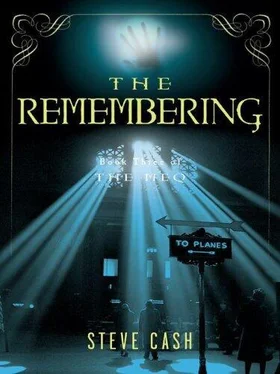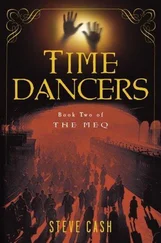“Thanks, Koldo.” I practically leaped out of the bus and hurried through the gate to join the rest. We walked in silence along the asphalt lane for a quarter of a mile, then rounded the ridge and saw our destination. Facing the sea and nestled against the rock outcroppings on the western side of the ridge was an ancient, fortified manor house of timber and stone. It was a composite of architectural styles and was likely built over the span of several centuries. There was also an unmistakable presence that we all felt at once. It was strange, exotic, and powerful, yet familiar.
I glanced around at us. Almost everyone would have fit into any crowd of twelve-year-old children anywhere in Britain. Even the Fleur-du-Mal had dressed simply and left his hair hanging loose and untied. Only his ruby earrings separated him from the others. Geaxi, however, wore her finest black leather leggings and black vest, which was held together with strips of leather attached to bone. She had adjusted her black beret to the perfect angle, and for shoes she wore her favorite ballet slippers. In full view and dangling on a leather necklace was the Stone of Will. Opari also wore the Stone of Blood around her neck, but inside her shirt, as did Sailor the Stone of Memory and Nova the Stone of Silence. The Stone of Dreams I kept in my pants pocket.
“Do you feel that, young Zezen?” Geaxi asked.
“Yes. Yes, I do, Geaxi.” I took hold of Opari’s hand and we continued on, climbing the wide steps and approaching the massive oak door that served as entrance to the manor house.
I raised my hand to knock and the door swung open. A tall, elderly man, probably well into his eighties, stood in the entry-way. He had ruddy cheeks and pale blue eyes, and except for a few long silver wisps that were left uncombed, most of his hair was gone. He was dressed in formal attire, although everything was slightly ill fitting and a little wrinkled. For ten or fifteen seconds, he stared back and didn’t say a word, gazing at each of us with a kind of childlike wonder. Finally, he said, “Please, come in. We’ve been waiting for you.”
Is it possible to have your whole life and everything you’ve known and taken for granted change completely and forever simply by walking from one room to another? The answer is yes and the next ten minutes would prove to be the most extraordinary ten minutes in the history of the Meq.
We were led through a sitting room crowded with furniture accrued over generations to a much larger room with twenty-foot-high ceilings and wide windows on the south and west sides, which let in a flood of sunlight. Two immense Persian rugs covered the floor and at the far end of the room a fire was burning in the fireplace, even though it wasn’t needed for warmth. Facing away from us toward the fireplace there was a long couch and two chairs, and though we couldn’t see who it was, someone was sitting in one of the chairs playing the cello, and playing it with passion. The low, slow, sonorous tones lifted and filled the big room. The old man turned to leave while the ten of us stood motionless, listening. Then Geaxi, who was on my left, leaned in close to my ear and whispered, “Concerto in D Major by Arthur Sullivan.” A moment or two later, the playing stopped.
“That is correct,” the cellist said. The voice was male, but high-pitched and raspy, and the accent was educated British. From behind the chair, he asked, “When did you last hear the piece?”
We all turned to Geaxi. Without hesitating, she answered, “November 24, 1866.”
“Ah, yes … the premier at the Crystal Palace.” He paused. “What did you think of the performance of Alfred Piatti on cello?”
“He was wonderful … a perfect balance of technique and emotion.”
“Yes, I agree. That night, he was a true master.”
Geaxi frowned slightly. “You were there?”
A long moment passed. “Yes,” the cellist said, rising out of his chair and turning to face us.
He was two inches shorter than we were, but wide-shouldered and long-armed, not unlike many of the tough street kids Ray and I had befriended when we lived in New Orleans. His cheekbones were high and wide, and his browridges were pronounced, but not any more than some of the pirates I’d seen while sailing with Captain Woodget, and certainly not as much as some of the illustrations I’d seen based on ancient skulls. He had a receding chin similar to that of a group of tribes I’d seen on our travels in western China. His lips were full, especially the lower lip, and his nose was broad, much like a prizefighter’s nose after taking too many punches to the face. His eyes were dark and intense, and his hair was a reddish brown and cut short. He was dressed in corduroy pants, which were tucked into green rubber Wellington boots, and a well-worn green plaid cotton shirt. He looked like the son of the gardener, or the gardener himself. But he was no gardener. He was Neanderthal — a living, breathing Neanderthal boy, and without a doubt, he was Meq.
He rested his cello on a stand near the chair and walked across one of the Persian rugs until he was three feet away from Geaxi. He stared into Geaxi’s eyes and she stared back. “Yes,” he said. “I was at the Crystal Palace on November 24, 1866. And I was with you in 1927 at Caitlin’s Ruby when you were trying to wake the aviator Charles Lindbergh. I heard your distress and sent my song to help.”
Geaxi said nothing. It wasn’t necessary. Her eyes said everything. They were exploding with wonder, joy, understanding, recognition, triumph, and surrender. I knew the look well. I had seen it in Opari’s eyes in the first moment we saw each other. As sudden, unlikely, and impossible as it seemed, Geaxi had just met her Ameq. Finally, and almost as an affirmation to what she was experiencing, she whispered, “You … are the other ‘Voice.’ ”
“Yes,” he said, nodding once.
“And you know of Caitlin’s Ruby?”
“Yes … since the beginning.” He reached in his shirt pocket and retrieved something small, then asked for Geaxi’s hand. She held out her hand and he placed a cube of salt in her palm, gently folding her fingers around it. “I believe your phrase is egibizirik bilatu .” He then made a few sounds unlike anything I’d ever heard and I realized it was the oral version of the “dream language.” He said, “Welcome, Traveler.”
Several seconds of stunned silence followed, then Ray couldn’t help himself. “Damn!” he said.
“Damn, indeed,” Sailor added.
“Indeed, indeed,” Mowsel echoed.
The boy told Geaxi his name in the “dream language.” It was impossible to pronounce and barely translatable, but similar in construction to the way we say Umla-Meq, Trumoi-Meq, or Zeru-Meq. The closest translation in English was “Traveler-All Directions,” so Geaxi decided to call him West. He smiled, showing even white teeth, and told her West it would be.
The boy, or West, turned and shifted his gaze to the rest of us, focusing on our eyes and leaning his head forward. His nostrils flared slightly, and I was certain he was recording and committing our individual scents to memory. One by one, he greeted us and offered cubes of salt. As he did so, he made another gesture, which was touching hands palm to palm with fingers spread, then putting his hand over his heart. He seemed to know a great deal about all of us. He knew I was the Stone of Dreams and guessed correctly that I had been the one to “understand” and “teach” the others. He then said cryptically, “And just in time.”
Staring into his eyes, feeling his touch, watching him move and speak, I couldn’t quit wondering how old West must be. His age would have to be at least twice the combined ages of every Meq in the room. A being that old with that much experience is incomprehensible and unimaginable. Still, he was friendly, gracious, and comfortable with everyone. He joked with Ray and complimented Nova on her “long eyes,” or her ability to have visions. He spoke to Mowsel in Cumbric, an extinct Welsh language, which delighted and surprised Mowsel, who was a scholar of languages. He traded Taoist poems with Zeru-Meq and exchanged greetings with Susheela the Ninth in the language of her childhood, which brought a smile. Sheela had not heard the language in forty-two centuries. He greeted Sailor with deep respect and complimented him for his part in the Meq escape from the Phoenicians three thousand years earlier. He then gave Sailor his condolences for what happened later in Carthage. After welcoming Opari, West told her she had always been the one he knew the least about, then he said the Stone of Blood was essential to the Remembering, which made all of us glance at each other. The Remembering had not been mentioned anywhere among the markings on the spheres.
Читать дальше












